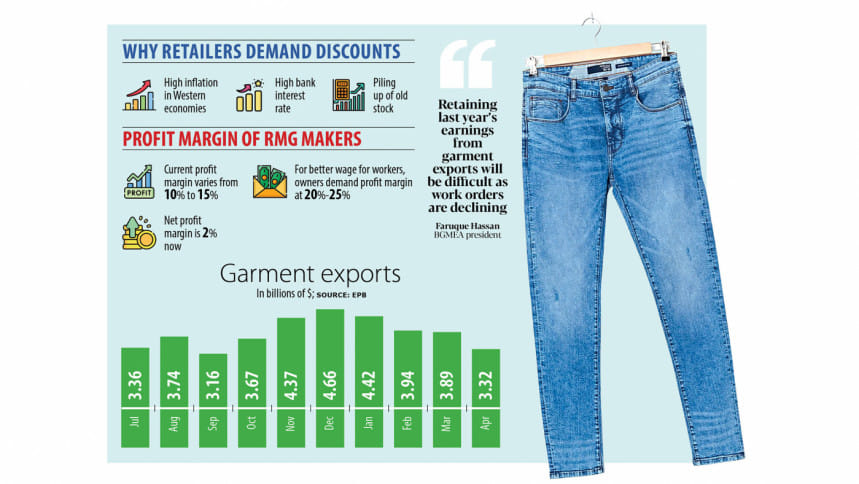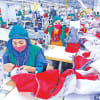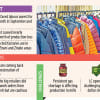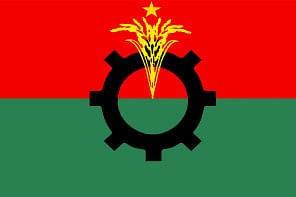RMG exporters face fresh pressure as buyers seek discounts

International clothing retailers and brands are demanding up to 5 per cent discounts from Bangladesh's apparel exporters, adding another challenge for the suppliers who are already grappling with multiple issues amid volatile global economic scenario.
"Suppliers are being compelled to accept the lower prices since retailers will not continue placing orders with them if they don't agree to the new prices. Sometimes, the prices are lower than the production cost," said Mohammad Hatem, executive president of the Bangladesh Knitwear Manufacturers and Exporters Association.
Under the current cost of production situation, local manufacturers need a profit margin of 20 per cent to 25 per cent instead of the current 10 per cent to 15 per cent, Hatem said.
"If the profit margin ranges between 20 per cent and 25 per cent, manufacturers can pay a living wage to workers. But the net profit goes down to 2 per cent if the gross profit stands at 10 per cent to 15 per cent."
He said retailers and brands need to follow ethical and responsible business practices as local suppliers have spent billions of dollars to strengthen workplace safety in line with the recommendations of the Accord and the Alliance, the two factory inspection agencies backed by global buyers.
Hatem was speaking at a dialogue organised on the occasion of International Labour Day. The HerNet Foundation organised the event at Gulshan Club in Dhaka.
Abdullah Al Mamun, vice-president of the Bangladesh Textile Mills Association, said despite paying a higher tariff for gas and power and spending heavily to establish the safest factories in line with global standards, local textile and garment suppliers are getting the lowest price from buyers.
Faruque Hassan, president of the Bangladesh Garment Manufacturers and Exporters Association (BGMEA), echoed both Hatem and Mamun.
He said buyers are demanding discounts because of the slowdown in sales in their respective markets and of the unsold inventories that have piled up in recent seasons.
Hassan called on retailers and brands to follow ethical buying practices as many manufacturers have already become bankrupt because they could not withstand the downward pressure on prices.
He warned that retaining last year's export earnings would be difficult this year because of the current downward trend of exports induced by the severe fallout of the Russia-Ukraine war.
Shaheen Anam, executive director of the Manusher Jonno Foundation, said workers must have a platform where they can speak. "The dignity of workers needs to be ensured."
She said: "We all want the garment industry to be successful in every way possible. We would like our garment industry to be the best in the world."
"At the same time, we don't want our garment industry to be known for cheap labour. We want the garment industry to be known as efficient and ethical."
Bernd Spanier, deputy head of the European delegation to Bangladesh, said he does not feel worried about the future of Bangladesh's garment sector.
Two weeks ago, the EU parliament held a special session and discussed about the apparel sector. During the discussion, parliamentarians recalled the Rana Plaza incident, he said, adding that the EU is formulating due diligence rules to ensure more responsible business behaviour from both buyers and suppliers.
According to BGMEA's Hassan, the first meeting of the new wage board for garment workers will be held on May 24, and the wage is expected to see a good raise.
Buyers need to play a major role to ensure the wage rise by increasing the prices of goods, he said.
Sirajul Islam Rony, workers' representative to the wage board, said garment exporters are getting one of the lowest prices from retailers and brands.
"Brands are making profits whereas workers are facing difficulties," he said, suggesting retailers follow ethical buying practices.
Alisha Pradhan, general secretary of the HerNet Foundation, moderated the dialogue.

 For all latest news, follow The Daily Star's Google News channel.
For all latest news, follow The Daily Star's Google News channel. 








Comments